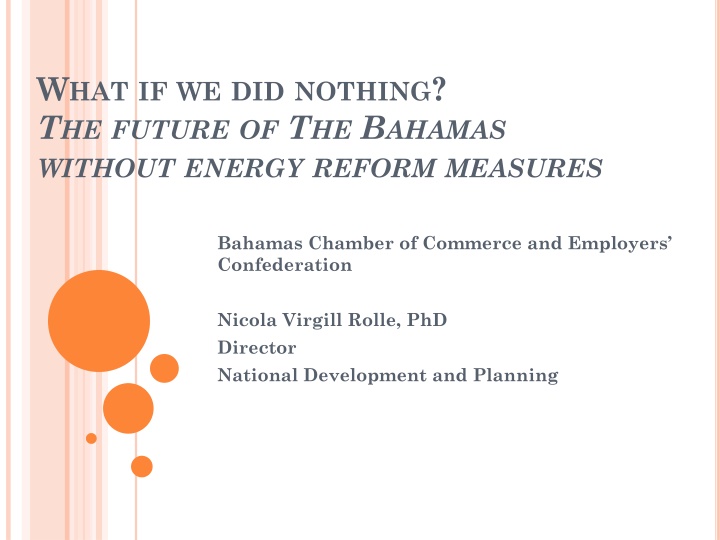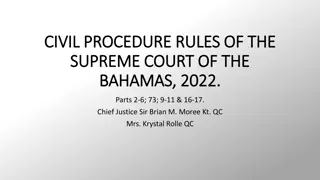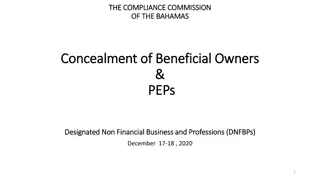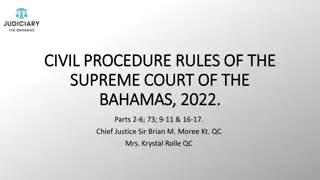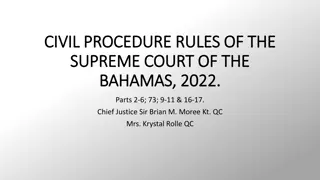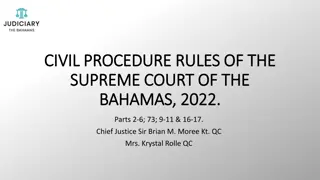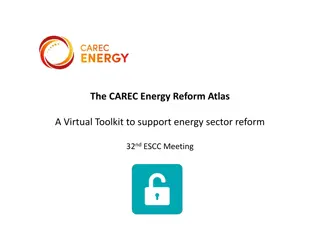The Future of Energy in The Bahamas: Urgent need for Reform
The Bahamas currently faces challenges with its energy situation, heavily dependent on imported fossil fuels leading to high costs and environmental impact. Without energy reform measures, the country risks continued high energy costs, environmental damage, and inefficiencies in the economy. Taking action is crucial to address these issues and pave the way for a sustainable and competitive energy future.
Download Presentation

Please find below an Image/Link to download the presentation.
The content on the website is provided AS IS for your information and personal use only. It may not be sold, licensed, or shared on other websites without obtaining consent from the author.If you encounter any issues during the download, it is possible that the publisher has removed the file from their server.
You are allowed to download the files provided on this website for personal or commercial use, subject to the condition that they are used lawfully. All files are the property of their respective owners.
The content on the website is provided AS IS for your information and personal use only. It may not be sold, licensed, or shared on other websites without obtaining consent from the author.
E N D
Presentation Transcript
WHAT IF WE DID NOTHING? THE FUTURE OF THE BAHAMAS WITHOUT ENERGY REFORM MEASURES Bahamas Chamber of Commerce and Employers Confederation Nicola Virgill Rolle, PhD Director National Development and Planning
THE ENERGY SITUATION TODAY Island chain makeup and the commitment to bring electricity to every corner of The Bahamas unified tariff system Dependent on imported fossil fuels to meet energy needs. Dependent on global oil prices Continued price uncertainty given global trends Balance of payments impacts High cost of fuel per kilowatt-hour sold High energy costs results in Uncompetitive business environment Reduces disposable household income Serious impact of current technology on the environment The need for renewable sources given issues of Climate Change
THE ENERGY SITUATION TODAY Reliability also appears to be an issue forces many businesses and households to operate their own generators Management issues: High system losses, Maintenance issues High delinquency rates There are few energy conservation measures Power consumption can be reduced by as much as 25 per cent through more effective conservation and efficiency measures. Some progress in the business sector Needs national standards for efficiency
WHAT DOES DOING NOTHING LOOK LIKE? Not addressing fossil fuel dependency Not addressing inefficiencies to reduce energy costs to consumers Continuing to contribute to CO2emissions, climate change and environmental damage Not addressing management issues with respect to reliability, maintenance and delinquencies Not addressing conservation and alternative energy
WHAT DOES DOING NOTHING LOOK LIKE? Not addressing fossil fuel dependency Not addressing inefficiencies to reduce energy costs to consumers Continuing to contribute to CO2emissions, climate change and environmental damage Not addressing management issues with respect to reliability, maintenance and delinquencies Not addressing conservation and alternative energy
COSTSOF INACTION: INEFFICIENCIESINTHEECONOMY Welfare Impacts Inefficiencies and high cost production result in huge deadweight loss in the economy as people pay more than they need to if supply side issues were addressed Price of energy Higher demand for fossil fuel based energy than is optimal because of lack of alternatives and conservation (suboptimal demand curve) D 1 D 2 Quantity of Energy
COSTOF INACTION: INCREASESTHECOST OFDOINGBUSINESS
COSTOFINACTION: CONTINUEDDECLINESIN DBI Overhead costs (fuel, operational costs) Aging infrastructure, technology
COSTOF GLOBAL INACTIONON CLIMATE CHANGE http://ase.tufts .edu/gdae/Pub s/rp/Caribbean -full-Eng.pdf
COSTOF INACTION: CLIMATE IMPACTS http://www.ccrif. org/sites/default/ files/publications /Bahamas_Coun tryRiskProfile_2 013.pdf
NATIONAL ENERGY POLICYOF THE BAHAMAS Bold policy announced with the National Energy Policy Security of energy supply through diversification of fuels; Modernizing the country s energy infrastructure; Development of renewable energy sources such as solar, ocean energy, biofuels, waste-to-energy and wind Energy conservation and efficiency; Development of a comprehensive governance/regulatory framework to effectively support the advancement of the energy sector to be effectively able to facilitate the introduction of renewables and the diversification of fuels; and Eco-efficiency in the manufacturing, agricultural and tourism sectors and government as leaders in energy conservation and the use of renewable energy . 1. 2. 3. 4. 5. 6.
THE DISCUSSIONSHOULDBEABOUTTHEPATHWAYTOACTION THROUGHAN EVALUATIONOF PRIORITIES comprehensive governance/regulatory framework to facilitate the introduction of renewables and the diversification of fuels Development of renewable energy sources Modernizing the country s energy infrastructure; Eco-efficiency and conservation and alternatives in the manufacturing, agricultural and tourism sectors diversification of fuels Impact Energy conservation and efficiency Cost
